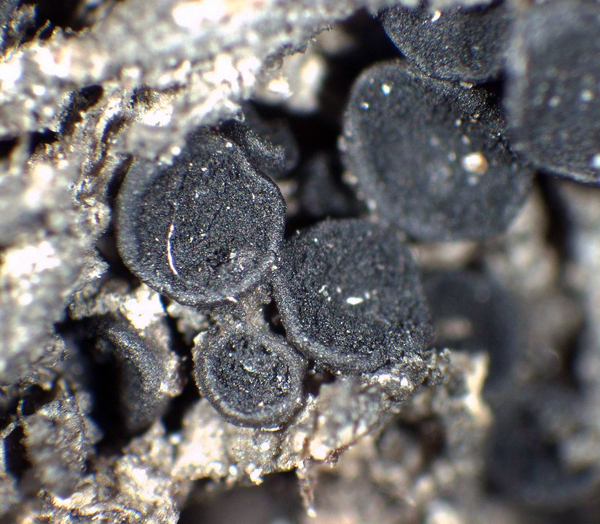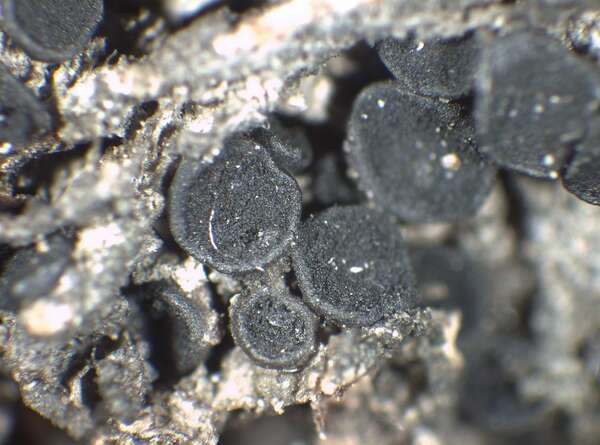Schadonia fecunda (Th. Fr.) Vězda & Poelt
in Hawksworth & al., Lichenologist, 12: 107, 1980. Basionym: Lopadium fecundum Th. Fr. - N. Acta Reg. Soc. Sci. Upsal., ser. 3, 3: 302, 1861.
Synonyms: Diplotomma sociale (Körb.) Jatta; Lopadium sociale Körb.
Description: Thallus crustose, episubstratic, greyish brown to pale brown, thin, continuous, granulose or minutely verrucose, not markedly changing colour when wet. Apothecia lecideine, black or brown-black, sessile, constricted at base, 0.5-1.5 mm across, with a matt, concave to finally very slightly convex, smooth disc and a thick, smooth, often inrolled and shiny proper margin. Proper exciple paraplectenchymatous, of radially arranged hyphae, dark red-brown in outer part, paler within; epithecium dark brown, K+ purplish brown, N+ violet; hymenium colourless or partly yellowish brown, 150-175 µm high; paraphyses richly branched and anastomosing, slender, 1-1.5 µm thick at mid-level, the apical cells only slightly wider; hypothecium dark brown, K+ purplish brown. Asci (4-)8-spored, clavate to cylindrical-clavate, the apical dome K/I+ dark blue with a pale, conical-pointed apical cushion (axial mass), the wall I-, but the thin outer gel I+ blue, Bacidia-type. Ascospores strongly muriform, hyaline, broadly to narrowly ellipsoid, (22-)30-50(-60) x (10-)12-18(-20) µm. Photobiont chlorococcoid. Spot tests: K-, C-, KC-, P-, UV-. Chemistry: without lichen substances.
Growth form: Crustose
Substrata: soil, terricolous mosses, and plant debris
Photobiont: green algae other than Trentepohlia
Reproductive strategy: mainly sexual
Commonnes-rarity: (info)
Alpine belt: very rare
Subalpine belt: very rare
Montane belt: absent
Dry submediterranean belt: absent
Humid submediterranean belt: absent
Padanian area: absent
pH of the substrata:
1 2 3 4 5
Solar irradiation:
1 2 3 4 5
Aridity:
1 2 3 4 5
Eutrophication:
1 2 3 4 5
Poleotolerance:
0 1 2 3
Altitudinal distribution:
1 2 3 4 5 6
Rarity
absent
extremely rare
very rare
rare
rather rare
rather common
common
very common
extremely common
Loading data...
Occurrence data
Predictive map
Growth form: Crustose
Substrata: soil, terricolous mosses, and plant debris
Photobiont: green algae other than Trentepohlia
Reproductive strategy: mainly sexual
Commonnes-rarity: (info)
Alpine belt: very rare
Subalpine belt: very rare
Montane belt: absent
Dry submediterranean belt: absent
Humid submediterranean belt: absent
Padanian area: absent
pH of the substrata:
| 1 | 2 | 3 | 4 | 5 |
Solar irradiation:
| 1 | 2 | 3 | 4 | 5 |
Aridity:
| 1 | 2 | 3 | 4 | 5 |
Eutrophication:
| 1 | 2 | 3 | 4 | 5 |
Poleotolerance:
| 0 | 1 | 2 | 3 |
Altitudinal distribution:
| 1 | 2 | 3 | 4 | 5 | 6 |
Rarity
absent
extremely rare
very rare
rare
rather rare
rather common
common
very common
extremely common
Loading data...
Occurrence data
Predictive map








